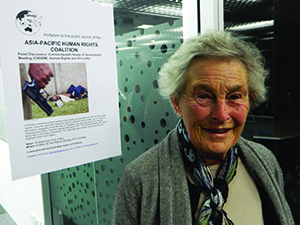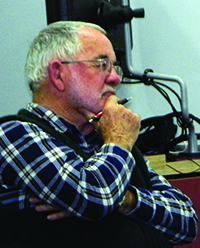AUCKLAND (Pacific Media Watch): A newly formed umbrella human rights organisation last night called on the New Zealand government to block host nation Sri Lanka from chairing the Commonwealth Heads of Government Meeting (CHOGM) after the November summit.
The Asia-Pacific Human Rights Coalition (APHRC), representing 10 New Zealand-based human rights organisations, called on the government to take this step in view of Sri Lanka's "dismal human rights record".
Under normal circumstances, the top-elected official of the previous host country assumes the role of chairperson-in-office of the Commonwealth of Nations after the completion of the biennial summit, and holds the position until the next CHOGM.
“I think New Zealand, especially the New Zealand government, should speak out much more strongly, against what’s happening in Sri Lanka as was said in the forum tonight,” APHRC co-founder Joan Macdonald told Pacific Media Watch at the launch of the coalition at AUT University.
 “Other countries that have behaved like that have been boycotted and told that they have to stop the human rights abuses,” she added.
“Other countries that have behaved like that have been boycotted and told that they have to stop the human rights abuses,” she added.
Macdonald, who also represents the Women’s International League for Peace and Freedom-Aotearoa (WILPF), supported the resolution strongly, but also said: “I’m not holding my breath about it”.
No boycott
Although it was suggested at the coalition meeting that New Zealand should boycott the CHOGM meeting in Colombo, Sri Lanka, on November 15-17, it was eventually agreed that would be unrealistic.
If New Zealand Prime Minister John Key were to boycott the meeting, he might not be alone, as his Canadian counterpart Stephen Harper is contemplating doing exactly that.
When Sri Lankan President Mahinda Rajapaksa talked during the 2011 CHOGM meeting in Australia, Prime Minister Harper walked out of the meeting.
Harper had said coming into the 2011 meeting that he would boycott Sri Lanka’s meeting if human rights abuses linked to the "bloody end" of the Tamil insurgency there was not investigated.
According to the Toronto Star, Canada is the only country yet to advise whether or not it is attending the CHOGM meeting.
“Given that the Sri Lankan government has taken no serious steps towards promised human rights and political reforms…this virtually guarantees that Prime Minister Harper will not attend the CHOGM,” David Petrasek at the Centre for International Policy Studies in the Canadian capital Ottawa wrote earlier this year.
Human Rights Watch this week asked the heads of Commonwealth governments not to attend the CHOGM meeting because of Sri Lanka's "unwillingness to address ongoing human rights concerns".
Independent report
Just like Canadian authorities, Amnesty International Aotearoa New Zealand was also calling for an independent report on alleged human rights abuses in Sri Lanka, as it said lack of accountability was a problem in Sri Lanka.
“While there have been investigations, they haven’t been independent, they haven’t been adequate,” said Amanda Brydon, the advocacy and government relations manager of Amnesty International Aotearoa New Zealand.
Talking to Pacific Media Watch she said that even the “better recommendations” from the reconciliation committee had not been implemented.
In Amnesty International’s 2012 report of Sri Lanka, a range of human rights abuses was highlighted.
Torture and ill-treatment, crackdown on freedom of expression and freedom of association, arbitrary arrests and detentions and hundreds of thousands of internally displaced people were only a few of the disturbing details coming out of the South Asian country.
“What Amnesty sees is a lack of political will and a lack of wanting to admit to any violations or even to investigate them, so there’s a real refusal I think on the level to assess human rights, and make sure human rights are upheld,” Brydon said.
New Zealand’s role  A co-coordinator of the APHRC, Kevin McBride, said New Zealand needed to take a “much stronger role internationally” on addressing human rights issues.
A co-coordinator of the APHRC, Kevin McBride, said New Zealand needed to take a “much stronger role internationally” on addressing human rights issues.
“The fact that we haven’t considered boycotting the Commonwealth Heads of Government meeting, or bringing strong pressure on Sri Lanka, shows that currently, although our words may be good, our actions don’t always follow them,” McBride said.
He feared New Zealand trade with Sri Lanka could inhibit New Zealand taking effective action in relation to Sri Lanka.
Sri Lanka has been importing dairy products from New Zealand, but suspended the milk powder import following the recent Fonterra scandal.
Talking about human rights violations in the Asia-Pacific region, McBride called Sri Lanka “the outstanding example in our region at the moment”.
“The material that has been put together by Amnesty and others on the atrocities that followed the war demand our attention, and demand that we do something about it.
“Our government is in a position to do that and so we have to find ways to bring pressure on them to take that responsibility,” McBride said.
Human rights launch
Last night's forum on Sri Lanka held at AUT University, was also the launch of the Asia-Pacific Human Rights Coalition.
The APHRC was formed as a continuation of the Indonesian Human Rights Committee.
“The suggestion was made that [the Indonesian Human Rights Committee] be disbanded, and we decided rather than disbanding it that we expand it and incorporate all the human rights organisations in the region,” McDonald said.
McBride said the goal of the coalition was to “develop coordinated action in relation to human rights issues in the Asia-Pacific region, which had some relevance to New Zealand policy and involvement".
Amanda Brydon was impressed by the newly started coalition.
“I think it’s really great to have a coalition that provides a platform for all these different organisations to speak on Asia-Pacific issues, and really bring these different voices in an opportunity for different communities and organisations to talk about human rights issues in Asia-Pacific.”
Read Amnesty International’s 2012 report on Sri Lanka human rights abuses
Film-maker Callum Macrae talks about No Fire Zone: A case against Sri Lanka?
This work is licensed under a Creative Commons Attribution-NonCommercial 3.0 New Zealand Licence.
NEW APHRC GROUP FORMED
Video interviews with the co-founders
Joan Macdonald and Kevin McBride




